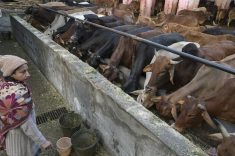The Japanese government has imposed tariffs on imported pork for the
next eight months, but that may not seriously hurt exports to the
high-paying market.
“It happened before and our exports actually went up,” Jacques
Pomerleau, executive director of Canada Pork International, said about
Japan’s reimposition of the tariff that raises minimum prices for
imported pork.
The Japanese government is forcing food retailers in Japan to sell
imported pork for no less than certain set prices. Pomerleau said that
Read Also

USDA’s August corn yield estimates are bearish
The yield estimates for wheat and soybeans were neutral to bullish, but these were largely a sideshow when compared with corn.
will force cheap cuts of pork out of the market because Japanese
consumers would not be willing to pay high market prices for
lower-quality pieces of meat.
The minimum price will apply until April. It was triggered when imports
surged beyond 19 percent of the three-year import average.
Pomerleau said the minimum price regulations are annoying.
“It’s not new. It’s always frustrating, but it’s not new.”
It is especially vexing for Pomerleau that the import surge is being
caused by a decline in Japanese pork production, which has created a
gap for foreign imports to fill.
Pork sales have also surged because consumers have been scared away
from beef by the discovery of bovine spongiform encephalopathy in
Japanese cattle.
Market analyst Janet Honey of Manitoba Agriculture said it is unclear
whether the tariff will hurt the market.
“It may not be a problem if they’re willing to pay the higher price,”
she said.
But it’s not a good development for the overall meat market, which is
suffering from a big surplus in the United States, Honey said.
“There’s just too much meat around. It’s just one more thing that’s
going to depress the market.”
These are trying times for Manitoba hog producers, said Manitoba Pork
Council chair Marcel Hacault. Many weanling producers have lost
contracts to supply animals to U.S. barns because producers there are
worried about country-of-origin labelling.

















